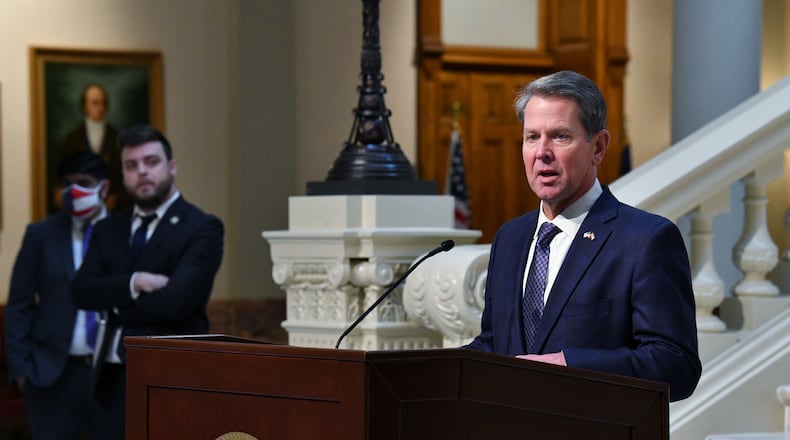Gov. Brian Kemp strongly endorsed adding photo ID requirements for absentee ballots on Monday at the start of a legislative session that’s sure to be shaped by a debate over voting laws after epic turnout helped Democrats flip Georgia in the race for president and sweep the Senate runoffs.
In an interview, the Republican said he is “reserving judgment” on a series of proposals that seek to end at-will absentee voting, ban ballot drop boxes and restrict state officials or outside groups from sending out absentee ballot applications.
But Kemp said he unequivocally supported measures to tighten voter ID laws for mail-in ballots, which Republicans have targeted after record turnout helped Joe Biden capture Georgia, snapping 24 years of GOP presidential wins, and Jon Ossoff and Raphael Warnock swept Senate runoffs.
“It’s a simple way to make sure that type of voting is further secured, and it’s a good first place to start,” Kemp said, adding: “It’s completely reasonable in this day and time, and in light of what’s going on, it would give all voters peace of mind and wouldn’t be restrictive.”
He’s found common cause with Secretary of State Brad Raffensperger, who wants to eliminate a voter’s signatures as the main verification method for an absentee ballot and replace it with options that could include requiring a voter to submit a copy of his or her driver’s license or an ID number with the ballot.
Any proposal would do away with signature matching, which results in absentee ballot rejections when election workers find inconsistencies between the signature on an absentee ballot envelope compared with signatures on registration forms.
Democrats and voting rights experts say there’s no need for tightening the rules. There’s no evidence of any widespread voting fraud, and critics say that mail-in balloting is already secure in Georgia, where signatures on mail-in ballot envelopes are verified twice before ballots are counted.
They point to an audit completed weeks ago by the secretary of state’s office that found zero cases of fraud among 15,000 Cobb County absentee ballot envelopes reviewed by law enforcement.
Credit: Alyssa Pointer / Alyssa.Pointer@ajc.com
Credit: Alyssa Pointer / Alyssa.Pointer@ajc.com
“If it ain’t broke, don’t fix it. There is no evidence or reason to believe our signature match system is insecure,” said state Rep. Josh McLaurin, D-Sandy Springs, who is set to introduce legislation that would allow Georgians convicted of felonies to vote before their sentences are completed.
But the governor and other Republicans have seized on the mail-in voting system, which was used by millions of Georgians who voted from home during the coronavirus pandemic during the primary, November election and January runoffs.
“We’re looking forward to working with the legislators on that,” Kemp said, adding: “We’ve had great conversations making sure we have a targeted, focused agenda. The one thing we all agree on is election reform. That’s front and center.”
Citizen’s arrest changes?
The governor also hinted he could back a push to repeal or adapt the state’s citizen’s arrest law, a more than 150-year-old statute that has come under intense scrutiny after the 2020 death of Ahmaud Arbery, a Black man who was shot and killed near Brunswick after three white men followed him.
A prosecutor invoked the statute when discouraging police from arresting suspects in Arbery’s death, and since then a bipartisan coalition of lawmakers, along with criminal justice activists, have called for repeal of the law.
“I’ve looked at the citizen’s arrest law, and we’ll be talking about it a bit in a few days,” Kemp said.
Credit: Alyssa Pointer / Alyssa.Pointer@ajc.com
Credit: Alyssa Pointer / Alyssa.Pointer@ajc.com
Kemp echoed his condemnation last week of the violent mob loyal to President Donald Trump that stormed the U.S. Capitol, and the governor pointed to the presence of heavily armed security officers at Georgia’s Statehouse as proof that state officials are vigilant.
“That’s not going to happen here,” he said of the riot in Washington. “People can gather peacefully, but we won’t let anything get out of hand.”
Kemp said he has the same stance on a renewed push to allow sports betting and other gambling that he struck after taking office: He opposes legalized casino gambling but wouldn’t stand in the way of a constitutional amendment that would let voters decide whether to allow casinos in Georgia.
And he said lawmakers stand ready to quickly pass an amended budget to keep the state government funded in case an outbreak of the coronavirus forces the General Assembly to quickly adjourn — an ever-present risk hanging over the start of the session.
“We’ve got to focus on our priorities. We’re still in the middle of a pandemic,” he said. “My focus is going to be on lives and livelihoods. Now we cannot get distracted from that.”
Staff writer Mark Niesse contributed to this article.
About the Author
Keep Reading
The Latest
Featured



